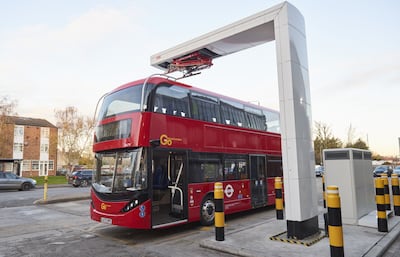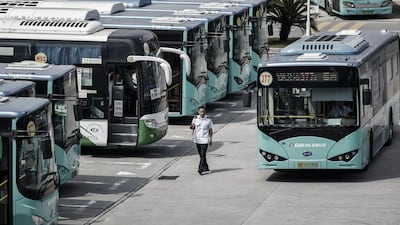Passengers will embrace low-emission transport because it is quieter and more environmentally friendly than running on diesel, a new global public transport boss said on Monday.
Renee Amilcar spoke to The National in her first interview since being elected president of the International Association of Public Transport.
She called on operators to use their emerging hydrogen and electric bus fleets as a way of enticing people towards public transport as the sector recovers from Covid-19.
Transport bosses gathering for a summit in Barcelona are facing the challenge of carving out a major role in the cities of the future even as the trend towards working from home damages their revenue.
The industry is highlighting its green credentials as governments look to curb emissions from polluting vehicles to meet international climate commitments.
Ms Amilcar, who is from Canada and has run public transport networks in Montreal and Ottawa, said the green factor could also be a selling point to passengers.
"People now are more conscious than before of climate change," she said.
"I think we have to try to bring a kind of fresh air to the way we sell public transit to people. I definitely think hydrogen, electricity, all of those modes could attract more people."
She said passengers might also welcome a smoother ride on electric buses.
"They are so comfortable as well," she said. "The noise is completely absent and you have air conditioning without polluting the air.
"I think this is something that will attract people but we will need to do more. We have to do advertising, a lot of marketing, which convinces people that this is the right thing to do."

Electric buses are taking up a growing market share but still represent only about one in 20 bus sales worldwide in an industry dominated by China.
Dubai's Roads and Transport Authority told the summit it planned to have a zero-emission fleet of buses by 2050. Electric buses were used to ferry delegates at last year’s Cop27 climate summit in Egypt.
Diesel's dominance of bus sales in Europe has fallen from 85 per cent to 67 per cent in three years, with more than 3,500 chargeable vehicles sold last year, according to the European Automobile Manufacturers' Association.
There are also moves to electrify railway lines that run on diesel more than a century after the dawn of electric traction.
Ms Amilcar said it would be easier for certain countries with relatively abundant electricity supplies to make the switch to low-emission transport.
"It's easy for me to talk about electric buses because the electricity is cheap in Quebec and Ontario but it's not the case in Brazil. So they will continue to use diesel," she said.
"But we have to continue to say that even diesel buses are better than taking the car."

Buses powered by hydrogen are in their infancy but there are high hopes for the technology.
Hydrogen gives off water vapour when burnt as a fuel but such vehicles are currently produced only at a small and expensive scale.
Ms Amilcar, who formally takes up her new role on Thursday, expects to attend the Cop28 summit in Dubai this year.
She succeeds Saudi transport boss Khalid Alhogail, whose two-year term is expiring as head of the global transport body.
The summit in Barcelona is the first since the pandemic that “forced us to think differently”, said Ms Amilcar, who sees ride-sharing, on-demand services and small vehicles such as taxis and scooters as the trend of the times.
“There is no way that I can continue to run a 40ft or 60ft (12 to 18-metre) bus with five or six people in the bus. However, I have to continue to deliver the service to those people,” she said.
“We need to find what else we can do to continue to deliver the service.”


